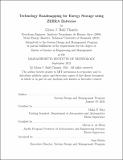Technology Roadmapping for Energy Storage using ZEBRA Batteries
Author(s)
Bahl Chambi, Gloria J.
DownloadThesis PDF (16.24Mb)
Advisor
Haji, Maha N.
de Weck, Olivier L.
Terms of use
Metadata
Show full item recordAbstract
Energy Storage Systems are expected to be the key enablers that will allow Variable Renewable Energy to increase its penetration in the electricity market. The objective of this thesis is to explore the application of ZEBRA Battery technology for Energy Storage Systems. The ZEBRA battery is of particular interest because it is a rechargeable battery built with Earth-abundant materials, primarily nickel and conventional table salt. Also, it has many advantages compared to Lithium-Ion Batteries, such as lower degradation rates, higher safety performance, wider temperature range of operation, and less maintenance. To understand the role of batteries in hybrid energy systems, successful examples of electro-chemical Energy Storage Systems are discussed, and an analysis of the stakeholders is performed. Additionally, three different locations were studied: Maine, Texas, and Guinea-Bissau. A Design of Experiments approach was implemented to explore different solutions to supply the electricity demand with Variable Renewable Energy in these locations. A model was built to calculate the energy supply and the cost of it for each solution. Cases on the Pareto frontier were selected and analyzed to understand the performance of batteries. Finally, a Life Cycle Analysis of the system, a comparison with Lithium-Ion Batteries, and a sensitivity analysis were performed. The main outcome of this work is a technology roadmap for ZEBRA batteries technology that will enable the adoption of this technology for Energy Storage Systems application by reducing its high capital cost. Currently, ZEBRA batteries exhibit a cost of about 600 USD/kWh. By applying the proposed projects, the cost of the battery is projected to be about 360 USD/kWh by the end of 2035.
Date issued
2021-09Department
System Design and Management Program.; System Design and Management Program.Publisher
Massachusetts Institute of Technology